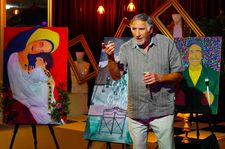 |
| iMordecai |
In first time writer and director Marvin Samel’s iMordecai, a series of unexpected events unfold when Marvin (Sean Astin) buys his father Mordecai (Judd Hirsch) an iPhone to replace his broken flip-phone. A Holocaust survivor, Mordecai’s relationship with his son is strained - the two distanced by a technological and cultural, generational divide. Meanwhile, his wife Fela (Carol Kane) is diagnosed with Alzheimer’s. When he begins taking lessons for his new phone from the 'Einsteins', the tech experts at the store, Mordecai discovers a new and unexpected lease of life.
In conversation with Eye for Film, Samel discussed how his lack of intention to direct led him to contribute to an important conversation, and rejecting on-set conventions to honour his collaborative ethos.
 |
| iMordecai |
Paul Risker: Why filmmaking as a means of creative expression?
Marvin Samel: I believe that filmmaking is the most expressive form of art there is. Now, I'm sure that the conductor of the London Philharmonic might feel differently, or the dancer in the Russian Royal Ballet, but growing up, my temple was the movie theatre.
I spent 20-plus years of my life as a cigar-maker, where I tried to bring art to everything we did, from our packaging and storytelling, to the blends we created. But I don't think anybody has ever shed a tear over a cigar blend. I don't think anybody has shed a tear or belly laughed for instance at George Clooney's tequila brand, Casamigos, but I know they've shed a tear or belly laughed at many of his films.
So to me, filmmaking is the most expressive art form there is. You have to be a problem solver and you have to be a psychologist. You have to be able to understand the human psyche and convey that through beauty, and through human emotion and frailties, and allow yourself to be completely vulnerable at the same time.
PR: Picking up on your point about vulnerability, iMordecai is based on your own relationship with your father. While filmmakers have to allow themselves to be vulnerable and share a film with the audience, for you, it ran deeper.
 |
| iMordecai |
MS: I never had any intention of being a filmmaker. I started writing the stories that became iMordecai when my mother Fela died from Alzheimer's. To cope with the pain and the guilt, I began to write down the vignettes that appear in the film. They’re are all true stories, which I told when hosting cigar events all over the world. Then I had an uh-huh moment when I took my dad kicking and screaming to get an iPhone, after his flip phone finally died. He's looking at it and asking, “Where are the buttons?” So I set him up for private lessons at the Genius Bar, and two months later he's taking six or seven lessons a week. I sneak up on him to see what the hell is going on, and there I see him holding court with all these impressionable young men and women.
One minute he's making them laugh, the next, there's a tear in this girl's eye that I'll never forget. I thought, 'This is it.’ This is how you tell the story of an elderly man who's seemingly at the end of his path, but he gets a second lease of life when he meets this girl. He understands the technologies that are available to him, and in the process, we learn together that you're never too old to find inspiration.
PR: Anna Rose Holmer, co-director of God’s Creatures, told me, “The epic task that is making a feature film, and the impossibility of pulling it off, is something we're all a little bit addicted to.” As a first time director and someone who never planned for it, what are your thoughts on this sentiment? Also, with your openness to collaboration, what are your feelings about the idea that the director is author?
MS: I feel that the director, like the CEO of a company, receives too much credit in filmmaking, and that's why for instance I could have said that I wrote the script myself. I hired a script doctor like many people in Hollywood do - you pay that person a fee and they help you craft the script, but you get all the credit. Many films that you think were only written by the writer, had a script doctor.
 |
| iMordecai |
When I saw how hard Rudy Gaines worked, and how much he elevated me to make me believe these stories were film worthy, I said, "You’ve got to be on the poster.”
It's such a collaborative art form, where if one person fails in their job, it has a major affect on the process. Think about how many people worked on putting men on the moon. I don't want to sit here and compare this because it's much smaller - what an egotistical asshole he must be. No, it's not like putting a man on the moon, but I'm using it as an example of how if one person messes up, it can be a catastrophe that brings the whole show down.
What’s addictive is you’re at the helm of this powerful ship and weapon of ideas, of art and beauty. You have more say than everybody else, but from my standpoint at least, I didn't want to say this is my film, and it's my way or the highway. I had a very clear vision, but the entire team had a tremendous say when presenting their ideas.
To give you an example, I didn't know coming on set that very few people read the script. In my mind if there's a hundred people on set, a hundred people read the script. When I was told that's not how it works, I said, "On my film set, that's how it's going to work.’ If you're running craft services, bringing coffee to everyone, you've got to read the script because I want you to understand what the stakes are.
You never know who might have an idea to solve a problem. So everybody read the script and it was like we were one big family trying to do the impossible - film 874 shots with a director that had never been on a film set before, in 23 days.
 |
| iMordecai |
PR: We think a film is about the characters onscreen, but more often it's about the audience - what we read into it and how we emotionally connect and respond. The father and son relationship is a universal theme and the gift of cinema and storytelling is not only to entertain, but to provoke self-reflection..?
MS: I hope that my film is a mirror onto the audience. When it comes to my relationship with my father, it was, and to this day is, a very difficult one. We come from two different universes. He grew up in pre-World War II Poland, where the mode of transportation was horse and buggy. He went through unfathomable suffering and he’s a comedian who has his dark side too. I’m of a different generation - an American who grew up in the Seventies and Eighties. I didn't understand him growing up and it took a long time.
I'm going to quote the great Bruce Springsteen. "We honour our parents by refusing to accept the most troubling characteristics of our relationship." I chose for my father and I, that the sum of our troubles would not be the summation of the lives we lived together. Those words gave me the courage to bring a layer of truth to the turmoil between Marvin and Mordecai in the film. Judd Hirsch and Sean Astin portraying my dad and I, channeled into their roles what they saw on set of my dad and I arguing.
The last three lines of my film were the first lines I put pen to paper. I knew that if I did my job and everyone else involved did theirs, when you come to the end of this film, and if you're moved when you see my father Mordecai and mother Fela walking away, whatever flaws you see in the film, will either be forgotten or forgiven.
 |
| iMordecai |
That was my goal and I hope you give this a chance. For five bucks you get to be part of my life and my universe, and I look forward to a continued conversation. This is an important film for having conversations about old age, losing oneself, the turmoil within families, and about forgiveness and love.
PR: Life is like a hamster wheel and it’s hard to make the time for self-discovery and self-reflection. Art and storytelling can showcase the best of people, creating empathy and encouraging self-reflection. It’s one reason we need art, despite it being the first to face cuts in tough economic times. No matter what walk of life we're from, we can find value in art and stories. We must remember that films come from people that are not perfect, so why would the films they create be perfect?
MS: Art made by a perfect person would be the worst kind of art I could ever want to experience. I want the imperfections of John Lennon pouring his soul out in Mother. I want the imperfections onscreen from those imperfect people that have the freedom to depict their ethos and their souls.
However you look at this film, I know I tried to give you my heart and my soul. I’ll allow history to be the judge of what the world thinks of my film. If you like it or you don't like it, I can accept that. What I can't accept is being relegated to irrelevancy. So I ask you to please watch this film of my family, to take the hour and 42 minutes, spend the five bucks and I promise you, it will affect you one way or another.
iMordecai was released on VOD in the US on April 11 2023.





















